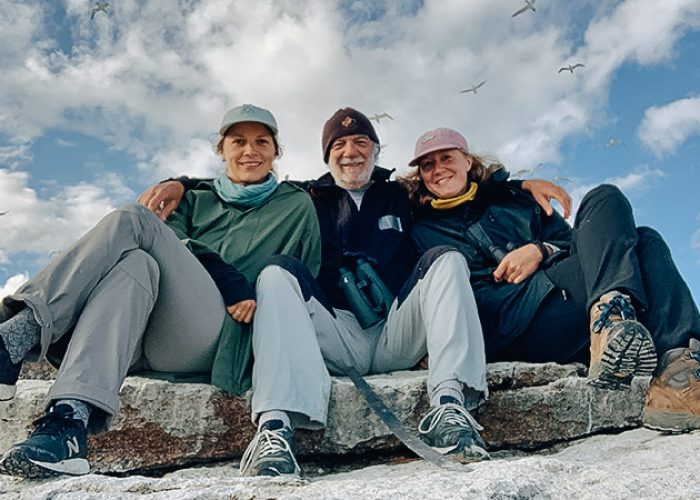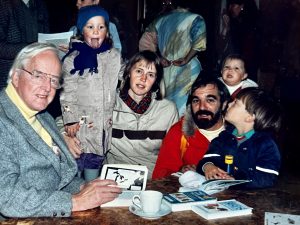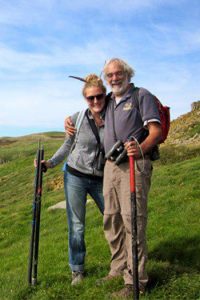GUARDIANS OF THE ENVIRONMENT
By Heidi Wicks, BA'02, MA'19

IN NEWFOUNDLAND AND LABRADOR, Dr. Bill Montevecchi is a household name.
The Memorial professor and 2022 honorary doctorate recipient’s frequent media appearances advocating for seabirds and wildlife, conservation and environmental assessments have been pivotal in educating the public about the dangers of mistreating the planet’s ecosystems.
As one of the world’s leading seabird experts, his devotion to the natural world is a cry for change, working towards “the personal and public embracing an ethic that accommodates the natural environment and blunts excessive consumerism,” he said.
Dr. Montevecchi influenced the career paths of his three children, all alumni of Memorial’s Faculty of Science, Nicholas Montevecchi (B.Sc.’06), Gioia Montevecchi (B.Sc.’06, B.Sc.(Hons.)’07, M.Sc.’12) and Marina Montevecchi (B.Sc.’13).
Gioia, Dr. Montevecchi’s oldest daughter, works as a protected-area planner with the Innu Nation. She supports the development of an Innu-led stewardship plan for Akamiu-UapishkU, a large area of pristine wilderness and integral part of Nitassinan, the Innu homeland. The area includes a new national park reserve, a proposed provincial waterway park and vast stretches of boreal and sub-arctic lands.
“The Earth is rapidly losing entire ecosystems,” she said. “Society values economic development over environmental protection. Once the wild is gone, it cannot come back as wild as it was.”
In this intimate and illuminating Q&A, father and daughter reminisce, praise the foundational importance of family, cite the necessity of laughter and philosophize about society, mortality and the future.
HW: How did having Bill Montevecchi as a dad influence your path?
GM: Both Dad and Mum really instilled in us that it’s not so much what we choose to do in life, but how we choose to do it. Dad taught us what it is to bring a whole self into every part of a life, to show up honestly, be forthright in what we believe in and always let curiosity guide us through challenge and conflict. That’s a game-changer because it requires humility. Dad is as socially conscious as he is environmentally [conscious]. We always had injured, sick, wayward birds in our house growing up. Murres, razorbills, petrels, gannets, cormorants, owls, ravens, hawks, loons, songbirds . . . we cared for them as a family. We held space for the effects of climate change, oil spills, light pollution, development, right in our home. My most treasured memories are when we would go to the wharf in Portugal Cove long after dark to release tiny storm petrels over the ocean. We would hold them in our small hands and with all our might, pitch them clear out into the dark sky over the black ocean, throwing our arms wide. We never knew which ones made it and which ones didn’t, but that was all part of it. And Dad was a total goofball growing up. Laughter was central for us as a family. Dad brought us into the realm of joy of his professional life. We were truly a part of it. As preschoolers – with Mum and Dad we camped by a large storm petrel colony on Green Island off the tip of the Burin Peninsula. When we were a couple of years older, we stayed in the lighthouse on Baccalieu Island – home to the largest Leach’s storm petrel colony in the world. We banded birds and were enthralled by the wonder and enchantment of these tiny resilient seabirds, their nocturnal behaviour and their colony activity.
HW: Did you always know what Gioia would become passionate about in her life?

BM: I really never know these things. What I did know was that Gioia was strong and independent. I was always impressed with the friends that she made, supported and valued — a diversity of people from all walks and orientations. That hasn’t changed. Gioia is brave and will do what she thinks is right, even at personal risk and loss. It is that type of action that may not be overtly rewarded but which earns respect. Her work ethic is intense and she fully immerses herself in the task at hand. She has a prowess and wisdom beyond her years. I often call on her when I have extremely difficult decisions to make. We often discuss conceptual issues, and I gain from Gioia’s developing perspectives about the land and how to live with it and accommodate. I sometimes refer to her as “daughter of wisdom.”
HW: In thinking about making change, what’s important?

GM: It’s important to acknowledge we are a part of the planet’s ecosystems, not at the top of its hierarchy. We have one planet with finite resources. Eighty per cent of the remaining biodiversity in the world is found in places Indigenous people inhabit. Ninety per cent of Canada’s protected areas established in the last 20 years resulted from collaboration with First Nations and Inuit communities. It is very important to ensure the resources and people required to protect healthy ecosystems and preserve sacred connections to it are fully supported now and into the future. To that end, we need to meet this global challenge with curiosity and unity. I believe it’s important we check our biases and surround ourselves with people who have a different world view, who have had experiences we haven’t, especially when those new learnings make us uncomfortable. We are stronger and make more informed action that way.
BM: I continue to rely on public outreach and awareness of the pervasiveness of our influences and perturbations on our natural environment. Every time I see a waterway being infilled or forest cleared for development large or small, I have a gut reaction that it all seems unnecessary and sacrilegious. We can act. We must act or otherwise assume responsibility for our complicity. It’s a magnificent world.

